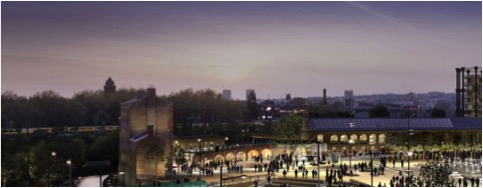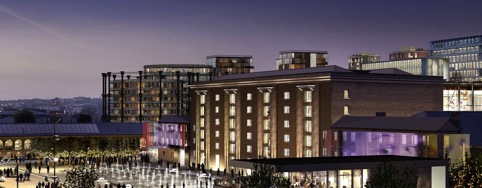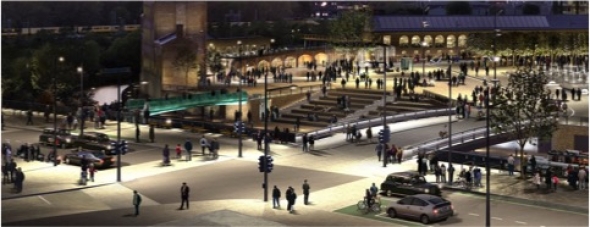Policing the Knowledge Quarter
Sam Dolbear takes a walk through the oppressive reality of Brexit era London
Granary Square is open to the sky but it also feels like a sealed model of how a future-London sees itself. There is a Waitrose with a wine bar, artificial hillocks in synthetic turf that resemble Teletubbyland, a canal occupied by slow-moving boat-parties adorned with bunting, an art-school with ping pong tables outside and fountains in which, at least, children can play. The website reads: 'KQ IS THE NEW KNOWLEDGE QUARTER AT THE HEART OF LONDON. We are the focal point for one of the greatest knowledge clusters.' It is a place that encapsulates New Labour, even after its death, as a persistent and strangely archaic vision of the future.
For about two years now I have worked as an assistant to a man with autism. He lives in Kentish Town and likes to go for walks around London. One Thursday afternoon in mid-July we found ourselves in Granary Square where we sat on a large platform, between a block of officially-graffitied portaloos and a reclaimed 1950s caravan that is actually a coffee-hut. It was a quiet spot and we sat there for an hour or so. At one point, the man I assist signalled to go to the toilet and I took him. Whilst I was outside the disabled toilet door, I could see that a security guard had approached my colleague and fellow-carer. When I came out, I asked him what had happened. He said the security guard had asked if there was anything wrong to which he replied no, as there wasn't. After which they said: 'Well, if we see anything or are alerted to anything suspicious, you know our first response has to be physical force.'
Although this threat was stated hypothetically, the police and security firms have a history of acting with such force against people with autism and their carers. Only a few days before this incident, Charles Kinsey, a black care-worker for a 27-year old autistic man in Florida, had been shot three times in the leg, despite the fact that Kinsey was holding his arms up in the air. The police officer had reportedly mistaken a toy truck for a gun. In Luton in February 2014, Faruk Ali had been pursued and beaten up by two police officers, PC Christopher Thomas and PC Christopher Pitts, as he went to put out the bins in front of his home. Despite evidence that the officers were laughing and taunting him, the same adjective reoccurs in their evidence: Ali's behaviour was 'suspicious.'

It might be claimed that this is particular to autism, given it is a disorder on a spectrum without any particular physical manifestation. But these incidents reflect a structural problem with police and security firms more generally, who can do nothing but equate 'suspicious behaviour' with assumed guilt. This assumed guilt is the basis for the legitimate act of physical force. But the problem is that which defines “suspicious behaviour” is subjective at the same time that it is already constituted by objective and institutional structures of racism and discrimination. The police and security firms attribute guilt to 'the suspicious' but those who are 'suspicious' are already defined for them. The way the security guard spoke is revealing. 'If we see [...], our response must be....'. Even if she didn't speak for the company's official position, she did speak on behalf of the implicit logic of the security companies. We must act to make you safe.
The recent release of two new mass-market books on autism — Neurotribes (2015) by Steve Silberman and In Another Key (2016) by John Donvan and Caren Zucker — reflects a growing interest in the condition. As vast surveys of autism's history, it is remarkable the extent to which each book largely ignores the relation between the condition and everyday violence and the anxiety of the threat of that violence everyday. Silberman’s history especially reads as an ode to capitalism’s ability to harness all neuro-types, whether in Silicon Valley or Silicon Roundabout or even at the Knowledge Quarter behind King's Cross. As if to reflect the physical nature of Granary Square itself, Silberman conceals the history of violence and intimidation in favour of a shiny vision of the future. Knowledge clusters as if there were no cops at all.

As London transforms ever-more intensely in the image of capital's glass front, it contains less and less space that is open and accessible. Granary Square is private – sold to Australian Super, Australia’s biggest superannuation/pension funds, in January 2015 – but public access is granted. Like a medieval liberty, the people are granted the freedom to roam but it is a freedom withdrawn at any moment from behind asphalt hillocks or surveillance cameras. A place for everyone is eventually a place for no-one, or, more precisely, a place for a select group of people who already felt safe and comfortable in this city anyway. As more and more areas in London face increasing (semi-)privatisation and securitisation, this is a struggle over freedom and to whom it might be granted.
When corresponding with King's Cross Estate Services it became obvious that we were talking at crossed purposes. The Head of Security proposed to add autism to the training requirements of the security team and condemned the behaviour of this particular security guard. He proposed to meet to discuss the incident. But the problem is far beyond the policy adaptions of a particular security company, itself outsourced within a chain of outsourcing. It is rather a question of the ownership of land and the policing of space. It is about how the city is structured and how this actively endangers further certain already-vulnerable groups. Granary Square remains London's vision, a rendering already made solid. But let's hope it becomes a relic of the past before it becomes an ongoing realisation of the city's future.
Sam Dolbear
samdolbear [AT] gmail [DOT] com
Mute Books Orders
For Mute Books distribution contact Anagram Books
contact@anagrambooks.com
For online purchases visit anagrambooks.com







